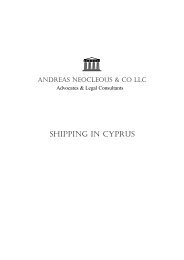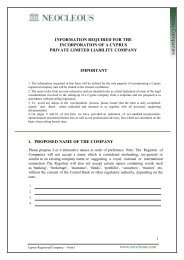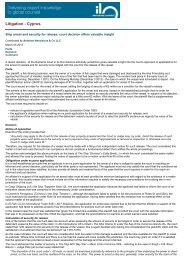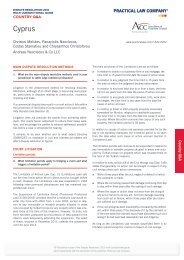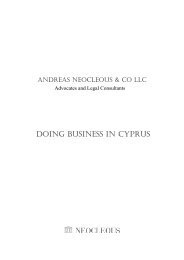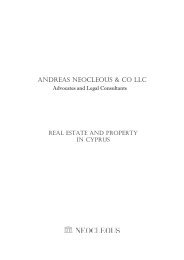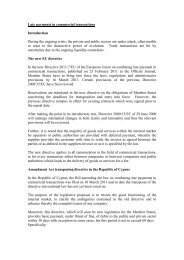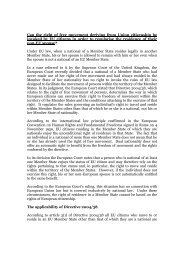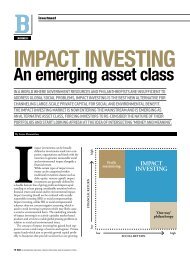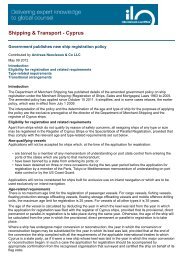Cyprus Based Company - Andreas Neocleous & Co
Cyprus Based Company - Andreas Neocleous & Co
Cyprus Based Company - Andreas Neocleous & Co
You also want an ePaper? Increase the reach of your titles
YUMPU automatically turns print PDFs into web optimized ePapers that Google loves.
global legal update<br />
<strong>Cyprus</strong> <strong>Based</strong><br />
<strong><strong>Co</strong>mpany</strong><br />
by Yuriy Y. BLAZHEVYCH<br />
as an Ideal Tool for<br />
Tax Optimization<br />
and Financial Planning<br />
by Dmytro T. KORBUT<br />
1. Introduction<br />
<strong>Cyprus</strong> has always been<br />
an excellent location for<br />
holding companies for a<br />
host of reasons that include<br />
its transparent legal<br />
system, excellent communications and<br />
world-class professional and banking<br />
services. It has a market economy and<br />
no restrictions on capital movements.<br />
The simple and modern tax system in<br />
<strong>Cyprus</strong>, with a corporate tax rate of<br />
only 10% and an extensive network of<br />
double tax treaties, further enhance its<br />
attractiveness as a regional business and<br />
financial centre. <strong>Cyprus</strong>’s tax system is<br />
in full compliance with the EU <strong>Co</strong>de<br />
of <strong>Co</strong>nduct for Business Taxation and<br />
the OECD’s rules for the elimination of<br />
harmful tax practices.<br />
<strong>Cyprus</strong> has always ranked among<br />
the main sources of investment into<br />
Ukraine and investment from <strong>Cyprus</strong><br />
to Ukraine during the period 1991-2005<br />
Yuriy Y. Blazhevych, Ph.D is a legal<br />
advisor with <strong>Andreas</strong> <strong>Neocleous</strong> & <strong>Co</strong><br />
Dmytro T. Korbut is a Head of Kyiv Office<br />
with <strong>Andreas</strong> <strong>Neocleous</strong> & <strong>Co</strong><br />
38 • The Ukrainian Journal of Business Law | September 2006 •
cyprus | global legal update<br />
amounted to more<br />
than USD 1.6 billion.<br />
The reasons for this<br />
are clear and include<br />
the traditionally close<br />
political, economic, financial<br />
and historical<br />
connections between<br />
<strong>Cyprus</strong> and Ukraine,<br />
the numerous advantages<br />
of the <strong>Cyprus</strong><br />
tax and legislative<br />
system (particularly<br />
the network of double<br />
tax treaties), official<br />
encouragement of<br />
investment activity<br />
abroad and free<br />
movement of capital.<br />
Furthermore, there is<br />
no doubt that in many<br />
cases investments<br />
from <strong>Cyprus</strong> were repatriation<br />
of Ukrainian<br />
capital previously<br />
exported due to perceived<br />
deficiencies<br />
including excessive<br />
regulation, unstable<br />
tax and judicial systems,<br />
unsatisfactory<br />
corporate laws and an<br />
unbalanced property<br />
structure. Under such<br />
conditions domestic<br />
businessmen and<br />
companies sought to<br />
minimize their tax<br />
and regulatory burden<br />
and protect their<br />
assets by unofficial<br />
means.<br />
However, it is now<br />
possible to take steps<br />
to minimise the tax<br />
burden and to protect<br />
assets entirely within<br />
the law and in accordance<br />
with all appropriate<br />
official rules and<br />
restrictions. <strong>Cyprus</strong> is<br />
a full member of the<br />
EU and a responsible<br />
and respected corporate<br />
and financial<br />
center and the use of<br />
a Cypriot holding or<br />
finance company is<br />
highly beneficial for<br />
tax optimization and financial planning<br />
for Ukrainian businesses. Furthermore,<br />
use of a Cypriot company may bring additional<br />
advantages over and above tax<br />
mitigation, including:<br />
• Asset protection<br />
• Attracting investments<br />
• Financial optimization<br />
• Tax planning and tax free gains on<br />
disposal<br />
2. The advantages of <strong>Cyprus</strong><br />
In the following paragraphs we outline<br />
the benefits of using a Cypriot corporate<br />
structure to deal with the issues<br />
described above.<br />
2.1. Asset protection.<br />
<strong>Cyprus</strong> offers a number of benefits in<br />
terms of asset protection, including:<br />
• An extensive network of bilateral<br />
and multilateral investment protection<br />
treaties which can give increased confidence<br />
to investors repatriating capital to<br />
Ukraine.<br />
• The confidentiality of ultimate<br />
beneficial owner can be protected by the<br />
appointment of nominee shareholders<br />
and directors in <strong>Cyprus</strong>. The registration<br />
of the company will be achieved<br />
through the appointment of nominees to<br />
hold shares on behalf of the true owners,<br />
whose identity therefore remains known<br />
only to the nominees and the fiduciary or<br />
registrar company only. After registration<br />
the nominees may delegate their<br />
rights to the beneficial owner, for example,<br />
by signing blank undated transfer<br />
documents or powers of attorney in relation<br />
to the investment. In this case there is<br />
no need for the Ukrainian beneficiary to<br />
obtain a special licence from the National<br />
Bank of Ukraine entitling him to make<br />
investments and establishing a company<br />
abroad unless he decides to disclose his<br />
identity as registered owner.<br />
• The corporate law and culture on<br />
<strong>Cyprus</strong> are long-established and based<br />
on English law in full compliance with<br />
EU requirements.<br />
• <strong>Cyprus</strong> is known for its fair and<br />
transparent judicial system, which effectively<br />
safeguards the rights of Ukrainian<br />
or foreign investors. Furthermore, while<br />
the quality and reputation of the legal<br />
system in <strong>Cyprus</strong> are on a par with the<br />
United Kingdom, costs are much lower<br />
in <strong>Cyprus</strong>.<br />
• Since September 2004 an agreement<br />
for mutual recognition court decisions in<br />
civil cases has existed between Ukraine<br />
and Cyp rus under which each country<br />
recogni zes and enforces decisions of the<br />
other country’s courts. <strong>Co</strong>nsequently,<br />
decisions of a Cypriot <strong>Co</strong>urt protecting<br />
the interests of a fo reign investor may be<br />
enforced in Ukraine.<br />
2.2. Tax optimization.<br />
The use of a <strong>Cyprus</strong> resident company<br />
for tax optimization has numerous potential<br />
benefits. First, a Cypriot company has<br />
a considerable advantage in joint venture<br />
activities in Ukraine, primarily because of<br />
the reduction in the impact of withholding<br />
taxes on the distribution of the joint<br />
venture’s profit under the <strong>Cyprus</strong>-USSR<br />
double taxation treaty of 26 August 1983<br />
which applies to Ukraine in accordance<br />
with the rules of legal succession. Within<br />
Ukraine withholding tax is charged at<br />
15% on the income of non-residents derived<br />
from Ukraine unless international<br />
treaties provide otherwise. Thus, the following<br />
payments received from sources<br />
in Ukraine by a resident of <strong>Cyprus</strong> will be<br />
exempted from payment of withholding<br />
tax in Ukraine and vice versa:<br />
(1) Royalties of all kinds<br />
(2) Profits derived from international<br />
traffic operations (including profits derived<br />
from the participation in a pool,<br />
a joint venture or in an international<br />
organization en gaged in the operation of<br />
international traffic);<br />
(3) Dividends (income from shares,<br />
founders’ shares and other similar<br />
rights);<br />
(4) Interest (income from loans, bank<br />
deposits, public loans, debt obligations);<br />
(5) Income derived from the sale,<br />
exchange, lease or any other form of use<br />
of movable property, excluding motor<br />
vehicles, situated in Ukraine;<br />
The following income will be free of<br />
tax in <strong>Cyprus</strong> and will be subject only to<br />
taxation in Ukraine and vice versa:<br />
(1) Profits derived in Ukraine by a<br />
resident of <strong>Cyprus</strong> if they are derived<br />
through a permanent establishment (an<br />
agency, an office or any other fixed place<br />
of business) located therein and only to<br />
the extent which is attributable to the<br />
activity of such permanent establishment<br />
(the fact that a resident of <strong>Cyprus</strong><br />
controls or is controlled by a resident of<br />
Ukraine shall not of itself be considered<br />
• The Ukrainian Journal of Business Law | September 2006 •<br />
39
global legal update | cyprus<br />
to be a reason for treating one of them as<br />
a permanent establishment of the other);<br />
(2) Immovable property belonging<br />
to a resident of <strong>Cyprus</strong> and situated in<br />
Ukraine;<br />
(3) Income derived by a resident of<br />
<strong>Cyprus</strong> from the sale, exchange, lease or<br />
any other form of use of the immovable<br />
property situat ed in Ukraine.<br />
Negotiations are in progress between<br />
Ukraine and <strong>Cyprus</strong> to conclude a new<br />
double taxation agreement to replace<br />
<strong>Cyprus</strong> offers a<br />
number of benefits<br />
in terms of establishing<br />
business<br />
the old USSR-<strong>Cyprus</strong> agreement. The<br />
second round of negotiations was concluded<br />
in May 2006 and a third round<br />
is expected to take place soon. A number<br />
of issues remain to be resolved and it is<br />
likely to be some time before the new<br />
agreement is finalized and effective. In<br />
the meantime the existing agreement<br />
remains in place.<br />
Secondly, all expenses of Ukrainian<br />
companies incurred for purchasing goods<br />
and services from <strong>Cyprus</strong> companies are<br />
fully deductible in arriving at taxable<br />
income, because under Ukrainian legislation<br />
<strong>Cyprus</strong> is no longer an offshore<br />
zone for Ukraine. A Ukrainian company<br />
purchasing any goods and services from<br />
a company incorporated in a country<br />
appearing on the list of offshore zones<br />
is allowed to deduct only 85% of any expense<br />
incurred. <strong>Co</strong>nsequently, Cypriot<br />
companies now have a great advantage<br />
compared with companies incorporated<br />
in offshore zones.<br />
Thirdly, <strong>Cyprus</strong> has a modern, business-friendly<br />
tax system, including the<br />
following benefits:<br />
• Residential principle under which<br />
there is no tax discrimination between<br />
resident or non-resident companies in<br />
<strong>Cyprus</strong>.<br />
• A corporation tax rate of only 10%,<br />
the lowest in the EU.<br />
• A VAT rate of only 15%, again the<br />
lowest in the EU. For some categories of<br />
output, VAT is charged at 5% or zero.<br />
• Dividends received by one <strong>Cyprus</strong><br />
resident company from another are exempt<br />
from all forms of tax.<br />
• If a <strong>Cyprus</strong> resident company<br />
owns 1% or more of the share capital of<br />
a foreign corporation any dividends it receives<br />
are also exempt from tax, except in<br />
the event that: directly or indirectly more<br />
than 50% of the activities of the paying<br />
company result in investment<br />
income and the paying company<br />
is subject to tax at a rate<br />
substantially lower than the<br />
<strong>Cyprus</strong> rate.<br />
• Tax credits are available<br />
for taxes paid out of <strong>Cyprus</strong>.<br />
• Under Cypriot law all<br />
expenses incurred for the<br />
production of the associated<br />
income are deducted before<br />
arriving at taxable income.<br />
• The profits of a Cypriot<br />
company’s permanent<br />
establishment in another jurisdiction<br />
are similarly exempt, subject to the same<br />
conditions as for dividends.<br />
• Interest income that is the result of<br />
the main activities of the company or that<br />
is closely connected to those activities is<br />
subject only to corporation tax at a rate<br />
of 10% like any other “active” trading<br />
income. Group finance income is treated<br />
as active trading income.<br />
• Group relief is available, allowing<br />
a loss-making company to surrender its<br />
losses to be set off against profits of a fellow<br />
group company.<br />
Finally, an extensive network of<br />
double tax treaties between <strong>Cyprus</strong> and<br />
many other countries makes the Cypriot<br />
company an ideal corporate wrapper as<br />
an intermediary between a Ukrainian<br />
company and a foreign investor from<br />
a third country that has no double tax<br />
treaty with Ukraine.<br />
Moreover, even for those who are<br />
deterred by <strong>Cyprus</strong>’s corporation tax<br />
rate of 10% it is always possible to deduct<br />
from taxable income certain payments to<br />
companies established in offshore zones,<br />
taking into account that the only withholding<br />
tax levied by <strong>Cyprus</strong> is a 10%<br />
(subject to treaty provisions) withholding<br />
tax on royalties derived from the use of<br />
a right or asset within <strong>Cyprus</strong>. All other<br />
dividend, interest and royalty payments<br />
made to non-<strong>Cyprus</strong> resident recipients<br />
may be made without deduction of tax.<br />
2.3. Attracting investments.<br />
Any Ukrainian company wishing to<br />
attract foreign investment must not only<br />
provide an attractive return, but also certainty<br />
of capital. In the current political<br />
and legal climate it is difficult for Ukrainian<br />
companies to give such guarantees<br />
on account of deficiencies in corporate<br />
law and reporting requirements in<br />
Ukraine. Using a Cypriot intermediary<br />
company could remove those problems<br />
and it easier for Ukrainian business to<br />
attracting foreign portfolio investments.<br />
Using a Cypriot intermediary company<br />
could also facilitate a future Initial Public<br />
Offering (IPO) to provide an exit for<br />
investors.<br />
2.4. Financial optimization.<br />
Since Ukrainian interest rates are<br />
higher than in any EU country, ranging<br />
from approximately 10% to 20%, Ukrainian<br />
companies would prefer to obtain<br />
credits or loans from foreign banks at<br />
European rates. However, European<br />
banks or other financial institutions do<br />
not generally consider Ukrainian companies<br />
as good credit risks, partly because<br />
of concerns about enforcing the debt<br />
should this prove necessary. The use<br />
of a <strong>Cyprus</strong>-based entity may remove<br />
these concerns. Moreover, Cypriot tax<br />
legislation does not contain any specific<br />
provisions relating to thin capitalization<br />
of companies, i.e. a debt: equity ratio<br />
requirement. A Cypriot company may<br />
therefore be capitalized with loans in<br />
order to finance a Ukrainian subsidiary<br />
company. Interest income that is the result<br />
of the main activities of the company<br />
or that is closely connected to those activities<br />
is subject only to corporation tax<br />
at a rate of 10% like any other “active”<br />
trading income. Group finance income is<br />
treated as active trading income. Interest<br />
paid from Ukraine to <strong>Cyprus</strong> will be exempted<br />
from VAT and withholding tax<br />
in Ukraine under the provisions of the<br />
double tax treaty as described above.<br />
2.5. Tax free purchase/sale of shares<br />
and assets.<br />
Mergers, acquisitions and other reorganizations<br />
in <strong>Cyprus</strong> may be carried out<br />
without tax cost. Thus, any asset (including,<br />
in certain circumstances, non-Cyp-<br />
40 • The Ukrainian Journal of Business Law | September 2006 •
iot real estate) that has scope for significant<br />
capital appreciation may be placed<br />
in a Cypriot corporate wrapper and sold<br />
without any liability to tax on the gain.<br />
Crucially, capital gains deriving from the<br />
disposal of shares and other securities<br />
(shares, bonds, debentures, founders’<br />
shares etc.) are exempt from all forms of<br />
taxation providing the company whose<br />
shares are being sold does not hold Cypriot<br />
real estate.<br />
3. The verdict<br />
All the foregoing factors make <strong>Cyprus</strong><br />
a highly attractive intermediate<br />
company jurisdiction as they offer the<br />
following benefits:<br />
• optimization of income streams,<br />
which will generally be tax exempt in<br />
<strong>Cyprus</strong> and not attract withholding tax<br />
as they leave;<br />
• subsidiaries that have scope for significant<br />
capital appreciation may be held<br />
in <strong>Cyprus</strong> and sold without any liability<br />
to tax on the gain;<br />
• <strong>Cyprus</strong>’s double tax treaty network<br />
and the EU Parent-subsidiary directive<br />
offer a number of other tax planning opportunities;<br />
• <strong>Cyprus</strong> offers a favourable exit<br />
strategy which allows payment of dividend,<br />
interest and royalties without payment<br />
of withholding tax.<br />
<strong>Cyprus</strong> can also be used as the location<br />
for the ultimate holding company,<br />
for instance in a group that is relocating<br />
to a new jurisdiction or on formation of<br />
a new publicly traded corporation with<br />
international operations. It is particularly<br />
suitable for any fund or investment vehicle<br />
since there is no tax on transactions<br />
in securities as defined, even if this is<br />
the entity’s main trading activity. Since<br />
there is no withholding tax on dividends<br />
there is no uncertainty over recovery of<br />
tax paid.<br />
Some caveats should be made. First,<br />
the holding company/IBC must genuinely<br />
be resident in <strong>Cyprus</strong>. Mere incorporation<br />
in <strong>Cyprus</strong> is not sufficient: the locus<br />
of real management and control must be<br />
in <strong>Cyprus</strong>. Second, this company must<br />
have a genuine reason for being; if it is<br />
no more than a tax-driven device the authorities<br />
may invoke the wide anti-abuse<br />
provisions of the law and withdraw the<br />
benefits. All this is in line with current<br />
EU tax principles, which basically affirm<br />
that any holding or subsidiary company<br />
within a group structure must have an<br />
economic or business function.<br />
The first step to find a right business<br />
solution concerning financial planning or<br />
tax optimization is to understand which<br />
legal entity type satisfies your business<br />
requirements in the best way. There is a<br />
range of business entities used by foreign<br />
investors to conduct business in <strong>Cyprus</strong><br />
such as: holding company, foreign company,<br />
international business company,<br />
Cypriot international trust or investment<br />
company. The total cost of incorporating<br />
a Cypriot registered company with<br />
an authorized share capital of up to<br />
CYP 5,000 (about USD 12,000) amounts<br />
to CYP 1,250 (about USD 2,500).<br />
The final choice of a company’s location<br />
(or any other form of fiscally beneficial<br />
entity) is a question of balancing tax<br />
and non-tax considerations. While no<br />
single location can claim first place on<br />
every test, <strong>Cyprus</strong> should always be on<br />
the shortlist.<br />
advertisement<br />
• The Ukrainian Journal of Business Law | September 2006 •<br />
41




